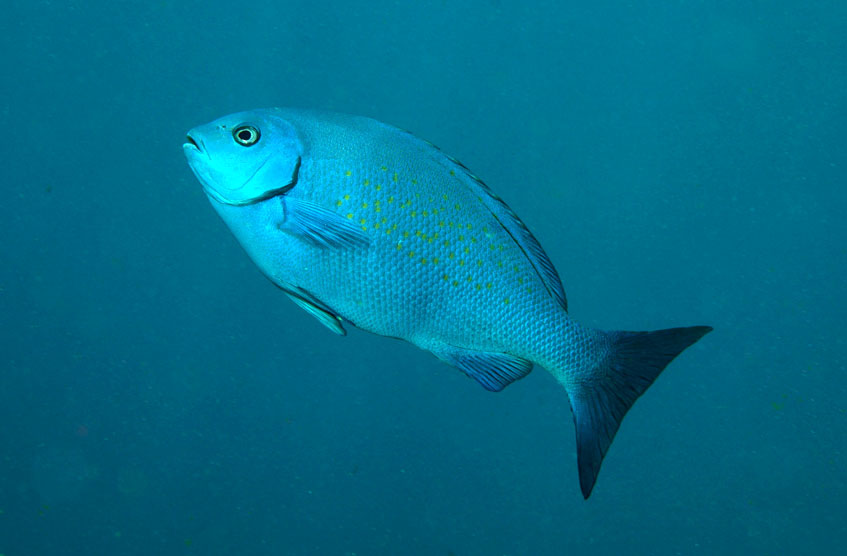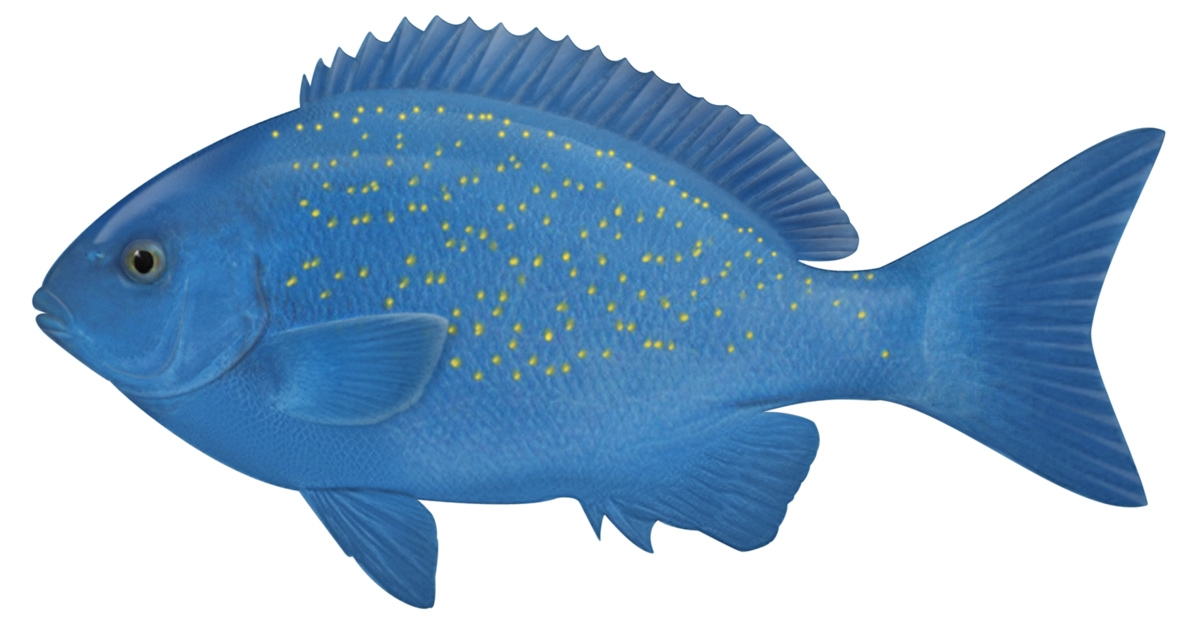
Bluefish
Girella cyanea
Bluefish (Girella cyanea) are a robust reef fish in the drummer/blackfish family Kyphosidae.
Bluefish are found in the south-west Pacific Ocean and occur along the east coast of Australia from Flinders Reef off Cape Moreton in Queensland to Eden in southern New South Wales. Bluefish are also found at Elizabeth and Middleton Reefs, Lord Howe and Norfolk Islands, the Kermadec Islands and the North Island of New Zealand.
Bluefish are protected from fishing under the Fisheries Management (General) Regulation 2019 in all NSW waters other than the waters of Lord Howe Island Marine Park. Heavy penalties apply for taking or possessing bluefish.
Description
Bluefish can reach a length of up to 76 cm. They have a bright blue colour with small yellow spots. These unusual colours make it easy to distinguish bluefish from other closely related drummer and blackfish species. The body changes to a grey-green colour after death.
Habitat and ecology
- Bluefish are ocean dwellers and do not generally enter rivers or estuaries. They can be found in coastal and offshore rocky reef areas in NSW from depths of 5–30 m.
- Juveniles live in tidal pools, and adults form schools over reef areas.
- Bluefish are not common in NSW coastal waters but are occasionally found within the Solitary Islands Marine Park and have been reported off Port Stephens.
- NSW DPIRD research suggests that fish around 52 cm (fork length) are approximately 39 years old. This suggests that the species is long lived and therefore may be vulnerable to overexploitation.
- The diet of bluefish is known to consist of crustaceans, smaller fishes, molluscs and other marine organisms, including calcareous seaweeds, brittlestars, cunjevoi and marine worms.
Why are bluefish protected from fishing?
- Bluefish seem to prefer offshore island habitats, and may never have been common in NSW coastal waters. In 1916 Roughley reported that bluefish were rarely seen in the Sydney fish markets, concluding that they did not occur on the NSW coast in any abundance.
- Commercial and recreational fishing catches over the last century may have had a serious impact on the NSW coastal population of bluefish, particularly if the coastal population has always been of limited size. Being a long-lived species, bluefish may also become sexually mature at a relatively late age and therefore be vulnerable to overexploitation.
- Catches of bluefish by mainland commercial fishers are rare and there hasn’t been a recording of bluefish in the Sydney markets for the past 25 years. Similarly, recreational anglers seldom catch the species; however, rock fishers targeting blackfish and drummer occasionally catch bluefish.
- Spearfishers have reported declining numbers of bluefish over recent decades.
- Bluefish are common in the waters of Lord Howe Island, and therefore there is an exemption to allow fishing for them in habitat protection zones within the Lord Howe Island Marine Park, with a bag limit of five fish per person. Commercial fishing for bluefish is not allowed in the marine park.
- Protecting bluefish from fishing activities in coastal waters should assist the recovery of the NSW mainland coastal population.

Legal implications
Taking or possessing bluefish from NSW waters other than the waters of the Lord Howe Island Marine Park is an offence, and heavy penalties apply. Penalties for taking a protected species can include fines of up to $110 000 for corporations while individuals can face fines of up to $22 000 and up to 6 months in prison, or both.
References and further reading
Ferrell DJ 2005, ‘Biological information for appropriate management of endemic fish species at Lord Howe Island’, Fisheries Report Series, Number 76, NSW Department of Primary Industries, Cronulla.
Pogonoski JJ, Pollard DA & Paxton JR 2002, Conservation overview and action plan for Australian threatened and potentially threatened marine and estuarine fishes, Environment Australia, Canberra.
Roughley TC 1916, Fishes of Australia and their Technology, Technology Museum, NSW Government, Sydney.
For further information
For more information on general fishing regulations check with your local fisheries office or visit www.dpi.nsw.gov.au/fisheries
To contact your local NSW Fisheries Office visit https://www.dpi.nsw.gov.au/contact-us/contact-a-dpi-fisheries-officer or phone 1300 550 474.


